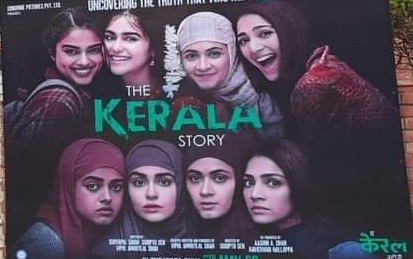Last Updated on June 12, 2023 6:56 pm by INDIAN AWAAZ
Syed Ali Mujtaba
In recent years Indian cinema is being fed on the growing trend of anti-Muslim hate movies. The Bollywood film industry is churning out the distorted portrayal of Muslims in the last nine years or so and such plots have matured to their real structure after the BJP government has come to power under the leadership of Prime Minister Narendra Modi in 2014.
Movies made in these years include; The Kashmir Files (2022) Padmaavat (2018), Lipstick under My Burkha (2016), Tanhaji (2020), and recently The Kerala Story (2023) Farhana etc. All these movies have an anti-Muslim anti-Islam slant blaming the Indian Muslim community for following a barbaric, oppressive, harsh, uncivilized religion. The goal of such films is to permanently damage the entire social fabric of India.

Bollywood has been using the medium of cinema to attack Indian Muslims for a long time. Such films are serving the designs of the RSS and the BJP with the hidden agenda to give a push to create a Hindu Rashtra where Muslims will become third-class citizens, with limited rights and with limited avenues for recourse.
Earlier Bollywood was known for making movies that promoted Hindu-Muslim brotherhood and communal harmony. They used to be declared tax-free by the government to promote the constitutional values of India. Now the latest trend is to make films that promote hatred and division in society and such films are made tax-free. This is an alarming trend in India making use of cinematic art to villainize the Indian Muslims.
Another purpose of making such movies is to divert the mind of the people from real issues, like soaring unemployment and economic distress, and other such things. The local media plays a big role in the promotion of such movies and in changing the political discourse of the country. The media instead of debating over the economy or other critical issues choose to talk about the newly released anti-Muslim film and make them busy talking about and forgetting the real issues.
During the Karnataka election campaign, Prime Minister Narendra Modi openly promoted the film ‘The Kerala Story’. He told the crowd at a rally in Ballari, Karnataka; “the Kerala Story is based on a terror conspiracy. It shows the ugly truth of terrorism and exposes terrorists’ design.” He urged the people to go and watch the “ugly truth.”
After Modi openly promoted the scandalous film, several BJP politicians too came out in support of this film. The Kerala Story was released in BJP-ruled states and declared tax-free. As a result, this film earned millions demonstrating the popularity of hate-centric films. The same can be said about The Kashmir Files, which minted huge money propagating hate against the Kashmiri Muslims and successfully polarizing Indian society.
In cinema, business formulas are being experimented and the kind of movie that churns much money is presented in different permutations and commutations to make more money. Cinema is a smarter and quicker medium to make money. It’s a medium where with a small investment, a high return is ensured. Examples are Kashmir File and the Kerala story.
The problem with the anti-Muslim film is that they cherry-pick incidents and don’t see it from a larger historical perspective. These films serve the purpose of the mental manipulation of the audience’s understanding of history and give a push to the ruling party’s majoritarian political agenda. In the case of Kashmir Files, the film blamed Kashmiri Muslims for it, while they had actually protected the minority Hindus. In the Kerala story, it is told that 32,000 Hindu women were converted to Islam and sent to Iraq and Syria to serve the jihadis fighting there. The alleged allegation is only 3 women were found to be involved in such activity, among them two were Muslims and one Hindu converted to Islam.
It looks obvious that the Indian film industry is walking in the footsteps of Nazi Germany to prevaricate, control, and influence a specific group of audiences to achieve political goals. The “big lie” strategy is used to brainwash the Hindu masses to convince them to develop apathy towards the Muslims loathing them for all the ills of the country.
Another alarming trendis the roles of the members of the censor board who allow hate Muslim movies to fit enough to get screening certificates. The members of the censor board are hand-picked by the government and are loyal to the ideology of the ruling party. They give certificates of screening to such films ignoring their consequences on society.
Earlier, the censor board did not allow such communally charged films to be screened at all. But now under the BJP rule, such kinds of movies are allowed to be screened even though they are promoting enmities against the communities in the country.
This is a generational level of destruction that is happening in India through the medium of hate films being churned out by Bollywood. This is polarizing Indian society to the level which is beyond redemption. These movies are very carefully crafted, scene by scene, with the intent that whoever watches will follow the propagator’s side of the story. The audience gulps such pulp fiction accepting such ideas as truth and eventually becoming the characters of the movie itself.
The kind of hatred, the kind of maliciousness, and the kind of visceral heat generated by these movies are promoting nothing but simply fissures in the country can be called an anti national activity. These films are widening the gap between communal spot lines, creating an atmosphere of hatred in Indian society. Indian citizens are watching this facet of the Indian cinema’s changing colors but no one dares to raise a voice of protest against such a dangerous trend. This is the harsh reality of contemporary India.
Syed Ali Mujtaba is a journalist based in Chennai
